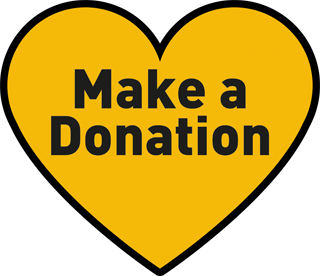Every year, in the countdown to the Lakes International Comic Art Festival in October, this year running as the virtual LICAF LIVE, we bring you a series of interviews with both guests and participants in the Comics Clock Tower (This year, also virtual).
Today, we’re talking to Jason Chatfield, an Australian cartoonist, caricaturist and illustrator based in New York. His work has been published in magazines and online, and in books published by Penguin Random House and Harper Collins. He is the current President of the National Cartoonists’ Society, and an internationally syndicated cartoonist, writing and drawing the iconic comic strip Ginger Meggs, which is published daily in 34 countries through Andrews McMeel Syndication.
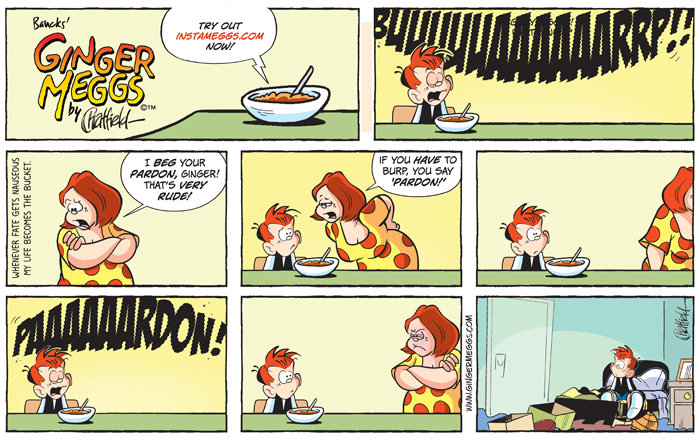
What are you working on, comics-wise, right now, and when will it be published?
Jason Chatfield: I’m currently in the middle of illustrating a book for Penguin Random House, which is celebrating the 100th Anniversary of the comic strip I write and draw called Ginger Meggs. It started in 1921 in Australia and has gone on to become an Aussie icon, along with being the third longest-running comic in the world. I’m 25 illustrations in, and have about 70 to go… It should be released in mid-2021.
Which comic project you’ve worked on are you most proud of and where can people see it or buy it?
Jason: Honestly, the one that has made the most difference in peoples’ lives has been my diary of contracting COVID-19.
When I got it, my wife and I isolated in an empty AirBnB in Tulsa, Oklahoma (Watchmen country!) and we battled the dreaded lurgy day to day… with no idea what to expect. Every time we googled “what to expect with COVID-19” we got a different answer, so I decided to publish the onset of my symptoms in the hopes that it would help other people who have contracted the virus.
The full diary is available here: jasonchatfield.com/coronavirus
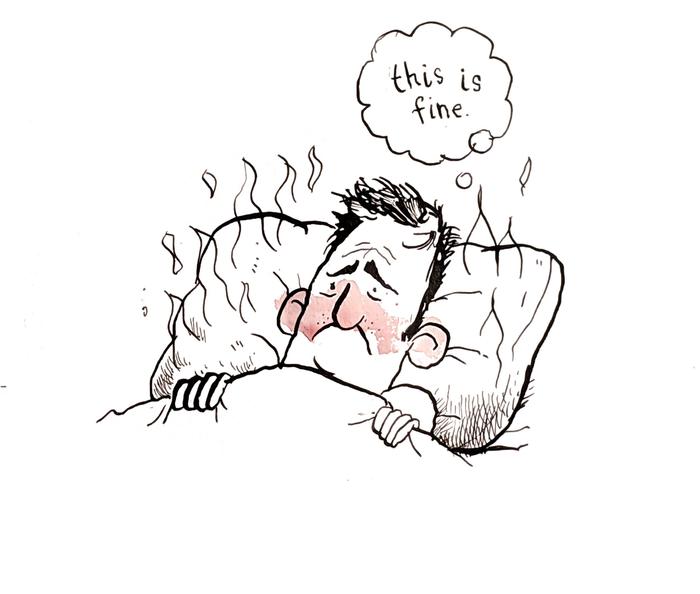
How do you plan your day as a creator? (Do you plan your day?)
Jason: I’m very particular about my planning. I have a post about it that kind of went a bit crazy viral this past year. I work from a calendar; not a to-do list. Everything I do needs to be scheduled, otherwise it will snowball into Friday afternoon on account of my dreamer tendencies.
I think it’s important that creators who have regular deadlines cultivate the ability to work within a time confine, and think about early as on-time.
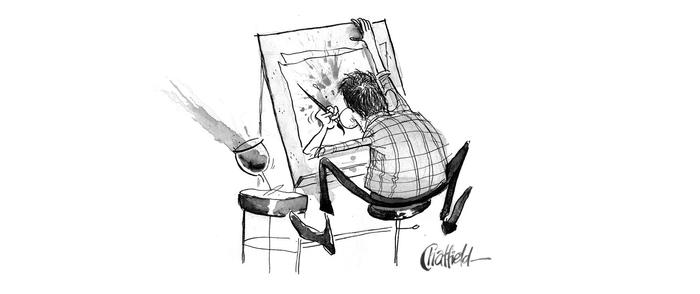
What’s the best thing about being a comics creator?
Jason: The freedom to express yourself through comics, and connect to someone else in an intimate way on the page is a great privilege. There is no other artform like comics, and the way people interact with them is like nothing in the world. Every year at comic con in New York and San Diego, I discover new and exciting creators and I feel like reading their work is like tapping into their mind. It’s a very personal thing, and I think we’re really lucky to have such a great outlet.
Sometimes stories just fall out of me and land on the page ready to share, and other times it’s like a long labour. When it’s the latter, I know something isn’t right so I will often switch things up to figure out how best to communicate the idea. The freedom to do that is a real privilege.
And the worst?
Jason: Taking on “other” work to pay the bills. If your passion projects aren’t filling the coin purse, sometimes we have to turn to things like advertising illustration and private commissions; I’ve had to do it for nearly two decades and I’m still only a baby at this artform.
I think when you have to force yourself to do art for something you’re not that interested in, it’s a shame, but then all you have to do is look across the street at the construction workers busting their arses from 6.00am, and you rattle yourself awake and say, “You get to draw pictures for a job, dummy! Pull your head in!” (Aussie saying).
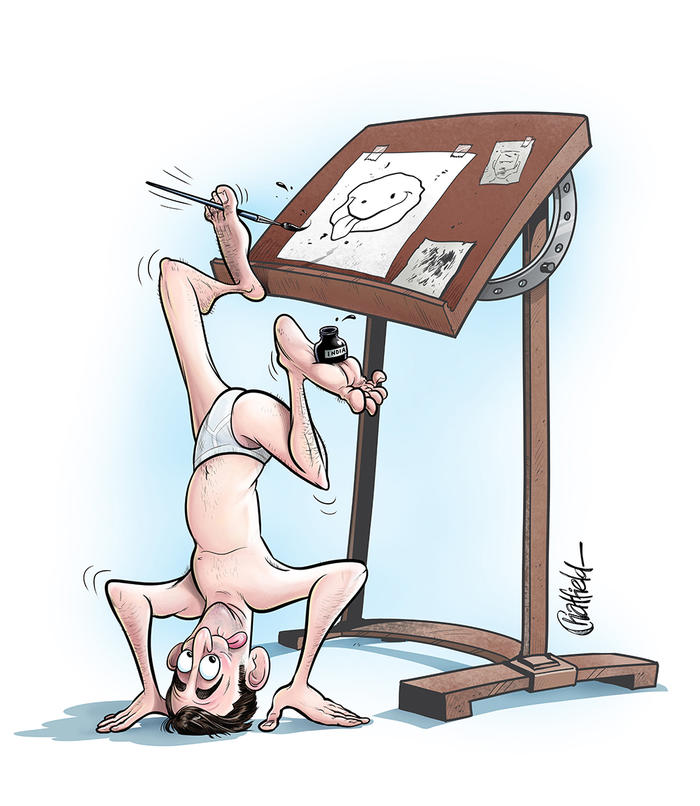
What most distracts you from getting your work done?
Jason: Honestly? My own brain. I have website blockers, brain.fm music in noise-cancelling headphones, and a locked door to my studio to try and keep me on task. My monkey mind jumps up out of the seat and throws ideas at me at the worst possible times, so I have to write them down on an index card by my drafting table and look at them later.
I also have to meditate to try and control my procrastinatory urges, especially later in the day as my willpower is depleted. I think having series (Like Watchmen – swoon!) on in the background while I work keeps me in my seat, but it ultimately divides my attention too much to be productive.
Do you think it’s easier or harder for young comic creators to get published today?
Jason: It depends entirely on what you mean by ‘published’. If you mean “picked up by Dark Horse” or a syndicate or book publisher like Andrews McMeel, or Penguin, it’s quite difficult, but if you mean publishing on platforms like Medium, TinyView Comics or Instagram, then there is literally no barrier.
My best advice to young artists is to not curate your art to what gets likes; curate it to what you like.
How has the Pandemic affected you, work wise – good or bad?
Jason: Honestly, I hit a real creative slump around March. Then I got the virus. That wasn’t fun. I live in New York, so we were Ground Zero for the virus for a long time. My neighbourhood had a lot of rolling evictions, so my street in Alphabet City in Manhattan started filling up with a large homeless population. No amount of giving or helping made a difference -the whole area turned into a tent city.
Eventually, my wife and I were both assaulted, so was our dog, and gun and knife crime rose by over 200%, so we had to leave our apartment and move to another place in Manhattan. It hasn’t been a good year for anyone, but it has definitely been a challenging one for us.
What do you think might be its most significant impact on the comics industry in general, long term?
Jason: All I have heard from my lit agent is that books are doing great, so I’m not sure. People are reading again, in really large numbers. People aren’t commuting, so Audiobook sales are down, but print and kindle sales are up. I don’t know that it’s wise to make any predictions about the future at this point; I couldn’t tell you.
Which one comic creator would you most like to meet, and why?
Jason: I’d love to meet Bill Watterson. He, to me, is the epitome of what a great comic creator is: the perfect marriage of thought, words and images.
I was lucky enough to briefly meet Richard Thompson, who I would put in the same Pantheon as Watterson, before he passed. For what it’s worth, I think the best cartoonist in the world right now is Sergio Aragonés (smiles).
What one piece of advice do you offer people looking to work in the comics industry?
Jason: Just start. Don’t do it to get famous, don’t do it to get “fans”, just do it because you love it, and most importantly do it for you.
Don’t let anyone else tell you how to do the thing you want to do. Find out what sets your heart on fire, and chase it. If you want to do it just for money, you’ll be miserable.
What’s your favourite comic right now and where can people get it?
Jason: I’ve really been enjoying The Art of Nothing; the 25 year celebration of Mutts, by Patrick McDonnell. It has a great foreword by Eckhart Tolle and Lynda Barry (whom I adore).
We had both Lynda and Patrick feature heavily in our NCSFest celebrations this year (NCSFest.com for the replay) and they’re both two people I could read endlessly. The book is beautifully published by Charlie Kochman at Abrams Comic Arts, and is available through their website (Mutts.com) or Amazon.
Jason, thank you very much for your time, and the very best of luck with all your current and future projects.
• Jason Chatfield is online at jasonchatfield.com | Twitter | Facebook | Instagram
• For the latest news about Lakes International Comic Art Festival Live 2020 visit www.comicartfestival.com | Facebook | Twitter | YouTube | Podcast | Tapas | Sign up for the LICAF Newsletter
• The Virtual Comics Clock Tower is online at licafclocktower.com

